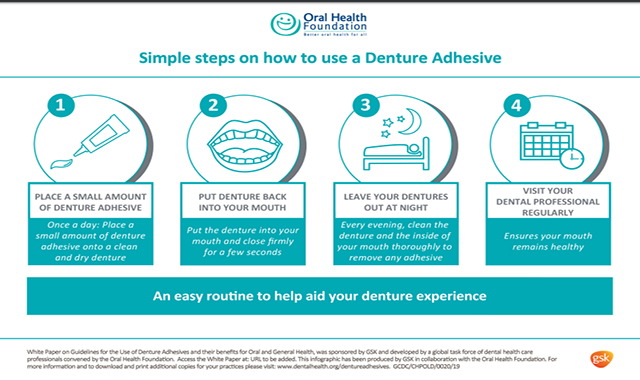What you to need to tell your denture patients about adhesives
Research suggests that a discussion about denture adhesives with dentists is crucial for your denture patients. But do you know what you would say? We share the latest information about the denture adhesive market.

Denture adhesives are not an excuse for poorly fitting dentures. However, they do provide some peace of mind to denture wearers regarding retention.
Yet, even the best designed and fitted prosthesis can leave patients disappointed with their retention or stability. Sometimes, adhesives can help at a psychological level to help a patient feel more comfortable that they will not fall out in public. In this way, adhesives can also help patients adapt to the new dentures. In some cases, you might suggest the adhesive to help with ulcers or tissue irritation in new denture wearers.
In other words, no matter how expertly you and your lab craft the denture prostheses, chances are that at least some of your patients will use adhesives with them.
Adhesives are particularly helpful under specific conditions. For example, when your patient suffers from Xerostomia, is recovering from a stroke, or has lost a significant amount of supporting bone, they might have problems with their denture’s function. Patients that have hormonal changes and neuromuscular disorders like Parkinson’s and Alzheimer’s might also have stabilization issues. Adhesives can help in these circumstances.
There are other times when adhesives are indicated. They can be helpful when a patient is wearing an immediate denture and the healing process changes the fit of the denture. Adhesives are also helpful when dentures are helping rehabilitate gross maxillofacial defects.i
The Journal of International Oral Health suggests that there should be standardized guidelines for the application of denture adhesives and use, as well as their removal.ii As their health professional, it is crucial to cover some basics with your patients about adhesives. Here are some suggestions about what you should include in the discussion.
1. Follow the instructions from A to Zinc
Denture adhesives can include zinc, which is meant to aid in adhesion. However, the FDA warns that an excess of zinc can lead to health problems, including nerve damage in the hands and feet.iii
Continue reading on the next page...
While there is no causal relationship established between complaints of nerve damage and the use of dental adhesives, the FDA requested that manufacturers include directions that prevent overuse. Also, they requested the packaging feature a label that it contained zinc or that manufacturers replace it in the product. However, not all manufacturers are obliged to do so.
To help your patients avoid risks of overuse, the FDA suggests the following:iv
- Follow the instructions on the package of those you have given the patient
- Not using more than is recommended (a regular 2.4 oz tube should last seven to eight weeks)
- Warn patients about the dangers of overusing products that contain zinc and that not all manufacturers list product ingredients
- Suggest products that do not contain zinc as an alternative
- Start with a small amount and try using as little as possible (i.e., if the adhesive oozes out from beneath the denture, they are using too much)
Invite patients to make an appointment for an adjustment if adhesive use is exceeding these guidelines.
Continue reading on the next page...
2. Share the four steps of optimal denture care
GlaxoSmithKline Consumer Healthcare and the Oral Health Foundation provided excellent resources for guidelines of denture care and the use of denture adhesives. Per the Oral Health Foundation, these guidelines are based on a consensus from experts all over the world. The four steps are:v
- Apply a small amount of denture adhesive cream to a clean and dry denture, preferably once a day.
- Firmly bite down on the dentures. If any overflow occurs remove and add extra adhesive rather than swallowing it. Refrain from eating or drinking for five minutes.
- At night, take the denture out for cleaning and remove and adhesive that remains on the denture and in the oral cavity.
- Make regular visits to the dentist for oral health checkups and denture upkeep.

3. Get specific about the specifics
Most denture-wearing patients are not aware of the different types of adhesives. You might want to take some time to explain the difference between the powders and the creams, as well as the pros and cons of each.
You might also want to give them practical advice about their use. For example, explain how to apply powders (i.e., a thin layer around the tissue side of the denture) vs. how to apply creams (i.e., pea-sized dabs around the tissue side of the denture).
Continue reading on the next page...
It is also critical to explain how to clean the adhesive off the prosthesis and the gums. If you don’t, there is a chance that your patients will use methods that damage the denture, like using boiling water or too much toothpaste. Also, denture adhesive cream can be difficult to remove from gums, so giving them advice on how to do so without damaging the tissue, like using hot water to loosen the material and rubbing gently with a washcloth, for example, would help patient hygiene and oral care.
Some dentists use a brochure they prepare for in-office visits and host on their website for their denture patients. It covers all these details and helps patients manage their new prosthesis.
4. Remind them about the importance of proper oral health
Many patients assume that once they get dentures, they no longer need to schedule appointments in your office. It is crucial to dispel this myth. Encourage them to make a regular check-up in six months before they leave the office.
Also, educate them on how their actions affect the denture’s success. Many patients do not understand how much of their denture’s fit and function depends on the supporting tissue and bone. Furthermore, they don’t understand how neglecting their oral health (even after they have lost their teeth) affects their gums and the bones underneath. By explaining how gum disease and bone resorption are related and how the patient can prevent them, you put them on a better path for success.

However, you should also prepare them for how the fit will change over time, particularly as it pertains to the soft tissues. Patients will often rely on adhesives when they need to come in for an adjustment or a new prosthesis. Set the proper expectations in these areas so that patients know when adhesive is okay to use and when it is time for them to come back.
Continue reading on the next page...
5. Indicate the contraindications
Adhesives, when used per the manufacturer’s instructions and in moderation, are generally safe for most denture patients. However, there are some people who should not use them, including:i
- Patients with an allergy to the components
- Patients unable to provide proper dental hygiene for themselves
- Patients suffering from extreme bone resorption and soft tissue decline, which has led to loss of vertical dimension
Furthermore, you should emphasize that the adhesive can’t fix everything. It is not meant to correct significant inadequacies of retention and function. Only an adjustment by you (or your lab) can do that. Also, it isn’t meant to fix broken dentures or those that are missing flanges.vi
Denture adhesives have their uses for your edentulous patients. But adhesives do carry some risks, so it is important to share some of these guidelines with your patients regarding their use. A conversation about these basics can help to keep patients healthy and their dentures functioning for years to come.
To download the PDF from the Oral Health Foundation of the Guidelines for the Use of Denture Adhesives and their benefits for Oral and General Health, please click here.
References:
“Denture Adhesives.” Fda.gov. 4 September 2018. Web. 1 October 2019. <www.fda.gov/medical-devices/dental-devices/denture-adhesives>.
Kumar, P Ranjith et al. “Denture Adhesives in Prosthodontics: An Overview.” Journal of international oral health : JIOH vol. 7,Suppl 1 (2015): 93-5. Accessed via Web. 1 October 2019. <www.ncbi.nlm.nih.gov/pmc/articles/PMC4516076/>.
“Denture adhesives guidelines.” Dentalhealth.org. Web. 1 October 2019. <www.dentalhealth.org/dentureadhesives>.
Masciadri, DMD, Rosanna U. “Denture Adhesives: A Guide for Patients.” www.drrosannamasciadri.com. Web. 1 October 2019. <www.drrosannamasciadri.com/wp-content/uploads/2016/11/Denture-Adhesives.pdf>.
[i] Kumar, P Ranjith et al. “Denture Adhesives in Prosthodontics: An Overview.” Journal of international oral health: JIOH vol. 7,Suppl 1 (2015): 93-5. Accessed via Web. 1 October 2019. www.ncbi.nlm.nih.gov/pmc/articles/PMC4516076/
[ii] Ibid.
[iii] “Denture Adhesives.” Fda.gov. 4 September 2018. Web. 9 October 2019. <www.fda.gov/medical-devices/dental-devices/denture-adhesives>.
[iv] Ibid.